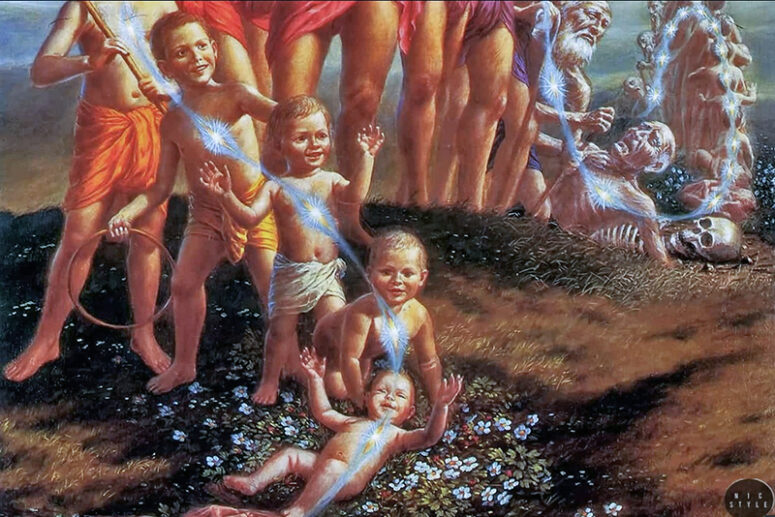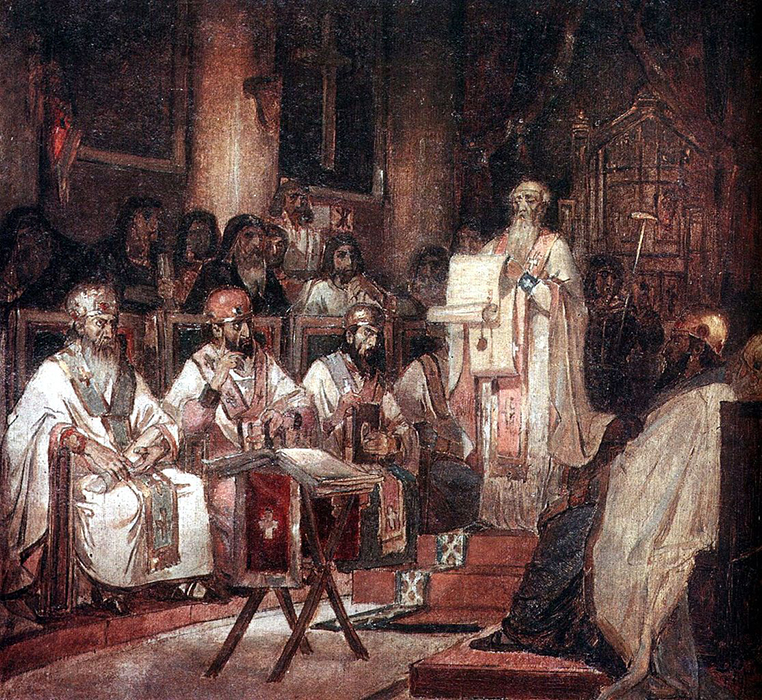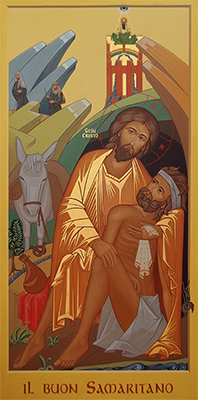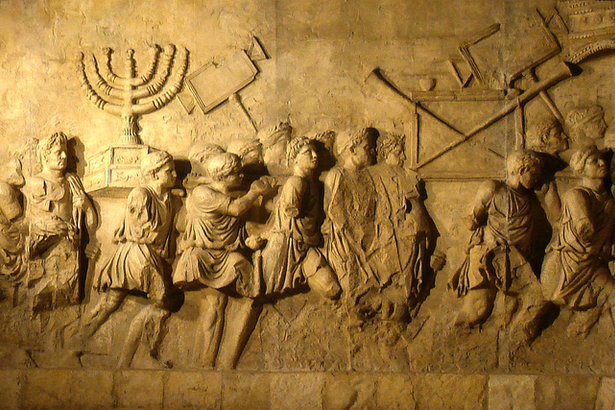
The misconception
It is a common false belief that Jesus and His first disciples professed reincarnation, but that the Church prohibited this teaching at its Council of 533 under the Byzantine Emperor Justinian. According to its proponents, all references to reincarnation were removed from the Bible after the Council. However, some hints at this doctrine have remained. For example, the verse in which Christ refers to John the Baptist as Elijah suggests, in their view, that John the Baptist was incarnate of Elijah.
Where are they wrong?
Exposing the lie
The doctrine of reincarnation is false for three reasons.
Its proponents rely on historically inaccurate claims and explanations
What evidence is there to prove that the biblical texts were indeed censored in 533? How could this claim possibly be verified? What historical sources might exist to prove or disprove it? Are there any witnesses who may have seen the fragments which were allegedly removed? Is there a list of these changes?
In fact, historical proof is non-existent. Conversely, common sense would tell us that censoring the Bible in 533 would have hardly have been feasible for purely technical reasons.
Christianity had remained the dominant faith in Byzantine for over two centuries; many Christian communities were active, and each had their copy of the Holy Scriptures. The faithful were reading from these copies during worship; quotes from these texts were being used in sermons, homilies, treatises and pamphlets. Censoring the Bible would mean having to rewrite all its copies, and review all the references and quotes. Completing this task would have been a feat in and of itself. Add to that the potential for conflict or controversy that any such exercise would have involved. How would this have ever been possible without leaving a paper trail?
Early Christians indeed had multiple and frequent disputes about the meaning of the biblical texts. The decisions of the Ecumenical Councils, the writings of the Holy Fathers and other documents that refute the common heresies shed light on the nature of these debates. However, despite these numerous disputes, even heretics did not accuse their opponents of using biblical texts censored at the behest of Emperor Justinian. So the alleged censorship of the Scriptures in 533 probably did not happen. It is also likely that the claim to the opposite is a fairly recent one.

Its adherents are bending the scriptural text to fit a particular world-view
Individuals who believe in reincarnation will seek- and probably find – the verses in the Bible in support of their theories. So might the believers in aliens. Communists may use quotes from the Bible to prove that Christ was a Communist, too. Many people with specific ideologies have sought to enlist Christ among their followers. All have made the same mistake. Thinking of Christ as a supporter of their beliefs, they looked for evidence of this in the Bible. This is a totally wrong approach to any text, and especially to the Scripture. Rather than bending Christ’s words to suit their versions of the truth, people should honestly try to understand His commandments for what they are worth.
They ignore the biblical and cultural context
We should understand all things in context. We should consider a person’s other statements on the same subject or the other relevant fragments of a text. For example, if we typed in the term “Elijah” the bible search window, we would find its occurrences in several contexts, including the fragment on the Transfiguration. “After six days Jesus took with him Peter, James and John the brother of James, and led them up a high mountain by themselves. There he was transfigured before them. His face shone like the sun, and his clothes became as white as the light. Just then there appeared before them Moses and Elijah, talking with Jesus.” (Matthew 17:1 – 3). If Elijah was truly incarnate of John the Baptist, who, then, was talking with Jesus?
That Elijah was mentioned together with John suggests only that John was fulfilling the mission of Elijah, so “he will go on before the Lord, in the spirit and power of Elijah.” (Luke 1:17). One may find in the Bible numerous other similar fragments. For example, when Jesus entered Jerusalem, its people greeted him: “Blessed is the coming kingdom of our father David! Hosanna in the highest heaven!” (Mark 11:10). They knew that Jesus was not David and that it was Him, not David who was bringing them God’s promised “Kingdom of David”
The doctrine of reincarnation is inconsistent with the biblical world view, which revolves around the idea that all of His people should establish and maintain an individual relationship with Him. As we read in the Book of Psalms, “My frame was not hidden from you when I was made in the secret place when I was woven together in the depths of the earth. Your eyes saw my unformed body; all the days ordained for me were written in your book before one of them came to be.” (Psalm 139: 15, 16)

To God, every human life is special and valuable, and every human is called upon to seek eternal life in Him. Christ says: “See that you do not despise one of these little ones. For I tell you that their angels in heaven always see the face of my Father in heaven.” (Matthew 18: 10). Apostle Paul underlines that Christ sacrificed His life on the cross for all the people, including himself: “The life I now live in the body, I live by faith in the Son of God, who loved me and gave himself for me. ” (Galatians 2:20).
Reincarnation precludes this individual relationship with God. If I lived my other life as a hamster, cat, a panda, and then as a Chinese emperor and a Russian publicist, what, then would be my true self? How would my life in God as a distinct individual be possible? Reincarnation rules out the existence of a separate identity of my own.
The Bible’s teaching is unequivocal: God sheds His love on every human, all humans and born only once, and all are special to Him. The Bible also teaches about the resurrection from the dead, when our one and only soul reunites with our one and only body, which is resurrected and transformed. Our Lord Jesus Christ said: “Now about the dead rising—have you not read in the Book of Moses, in the account of the burning bush, how God said to him, ‘I am the God of Abraham, the God of Isaac, and the God of Jacob’? He is not the God of the dead, but of the living.” (Mark 12: 26, 27)
The resurrection of Jesus Christ presages the rising from the dead of all the people:
But Christ has indeed been raised from the dead, the firstfruits of those who have fallen asleep. For since death came through a man, the resurrection of the dead comes also through a man. For as in Adam all die, so in Christ all will be made alive. But each in turn: Christ, the firstfruits; then, when he comes, those who belong to Him.” (1 Corinthians 15: 20 – 23).
Origins and purposes
As far as we can see, the false belief in reincarnation can be traced to a specific individual named Elena Blavatskaya (1831 – 1891). She presented it as a novel doctrine which she termed ‘theosophy’. To her audiences in Europe and America with enthusiasm for new and unorthodox spiritual leanings, this was hallowed as a new way to unite all of the world’s religions. To convince them that the teachings of the world’s religions were not fundamentally different, she claimed that the doctrine of reincarnation in Buddhism was also professed by Christ, and would have remained a part of the Christian teaching of the Church Hierarchy had not prohibited it.
Her misconception regained popularity almost a century later, in the heyday of the Oriental Gurus – real and self-styled. Because of the need to fit into their teaching the tenets of Christianity and its centrepiece Jesus Christ, they recycled the old claims that Christ’s teachings were the same as those of other religions and that His teachings were later distorted by the Church hierarchy.
In sum, there is nothing in the Scripture that supports reincarnation. The Scripture’s message is far more positive, optimistic and reassuring. Our Lord extends to each of us, individuals with separate identities, His offering of eternal and blessed life in Him. “For God so loved the world that he gave his one and only Son, that whoever believes in him shall not perish but have eternal life.” (John 3:16).
Translated by The Catalogue of Good Deeds
Source: https://foma.ru/uchil-li-iisus-reinkarnatsii.html




